大学英语大一下学期考试重点
大一综合英语教程知识点
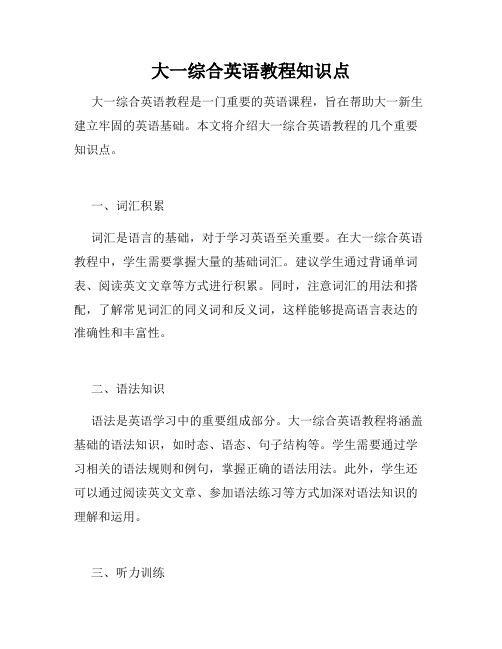
大一综合英语教程知识点大一综合英语教程是一门重要的英语课程,旨在帮助大一新生建立牢固的英语基础。
本文将介绍大一综合英语教程的几个重要知识点。
一、词汇积累词汇是语言的基础,对于学习英语至关重要。
在大一综合英语教程中,学生需要掌握大量的基础词汇。
建议学生通过背诵单词表、阅读英文文章等方式进行积累。
同时,注意词汇的用法和搭配,了解常见词汇的同义词和反义词,这样能够提高语言表达的准确性和丰富性。
二、语法知识语法是英语学习中的重要组成部分。
大一综合英语教程将涵盖基础的语法知识,如时态、语态、句子结构等。
学生需要通过学习相关的语法规则和例句,掌握正确的语法用法。
此外,学生还可以通过阅读英文文章、参加语法练习等方式加深对语法知识的理解和运用。
三、听力训练大一综合英语教程中的听力训练旨在提高学生的听力理解能力。
学生需要通过听取英文材料,如短对话、新闻报道等,锻炼自己的听力技巧。
在听力过程中,学生可以注意关键词的捕捉,理解说话者的意图和信息主旨。
同时,可以多听多练,提高听力的准确度和速度。
四、口语表达口语表达是英语学习中的重要环节。
大一综合英语教程中,学生需要进行口语练习,提高自己的口语表达能力。
学生可以通过模仿和跟读来提高发音准确性,同时注重语音语调的把握。
此外,学生还可以参加英语角、口语训练班等活动,与他人进行交流,提高口语表达的流利度和自信心。
五、写作技巧写作是英语学习的重要组成部分。
在大一综合英语教程中,学生需要学习写作技巧,如段落组织、句子连接、篇章结构等。
学生可以通过阅读优秀的英文作品,了解写作的特点和技巧。
同时,练习写作,如写日记、写文章等,不断提高自己的写作能力。
六、阅读理解阅读理解是提高英语综合能力的重要途径。
在大一综合英语教程中,学生将接触到各种类型的英文阅读材料,如新闻、文学作品、科技文章等。
学生需要通过阅读,提高自己的阅读理解能力,包括理解文章的主旨、细节和推理等。
建议学生进行大量的阅读训练,扩展自己的阅读广度和深度。
大学英语考试重点
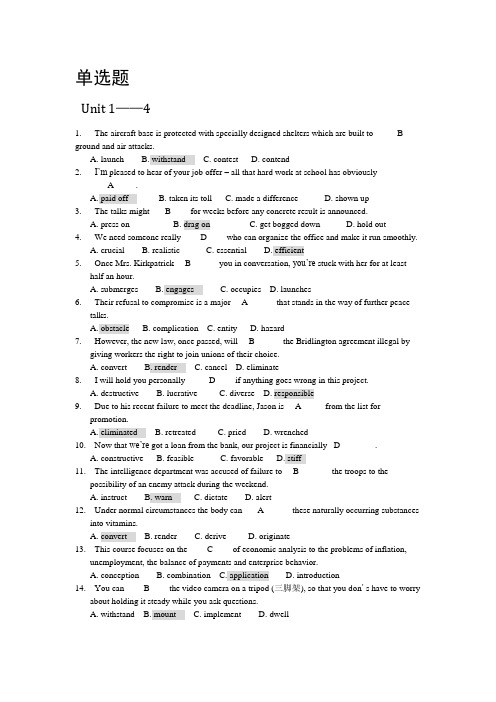
单选题Unit 1——41. The aircraft base is protected with specially designed shelters which are built to _____B___ ground and air attacks.A. launchB. withstandC. contestD. contend2. I’m pleased to hear of your job offer – all that hard work at school has obviously____A_____.A. paid offB. taken its tollC. made a differenceD. shown up3. The talks might ___B____ for weeks before any concrete result is announced.A. press onB. drag onC. get bogged downD. hold out4. We need someone really ____D____ who can organize the office and make it run smoothly.A. crucialB. realisticC. essentialD. efficient5. Once Mrs. Kirkpatrick __B______ you in conversation, you’re stuck with her for at leasthalf an hour.A. submergesB. engagesC. occupiesD. launches6. Their refusal to compromise is a major __A______ that stands in the way of further peacetalks.A. obstacleB. complicationC. entityD. hazard7. However, the new law, once passed, will __B______ the Bridlington agreement illegal bygiving workers the right to join unions of their choice.A. convertB. renderC. cancelD. eliminate8. I will hold you personally _____D____ if anything goes wrong in this project.A. destructiveB. lucrativeC. diverseD. responsible9. Due to his recent failure to meet the deadline, Jason is __A_____ from the list forpromotion.A. eliminatedB. retreatedC. priedD. wrenched10. Now that we’re got a loan from the bank, our project is financially _D________.A. constructiveB. feasibleC. favorableD. stiff11. The intelligence department was accused of failure to __B_______ the troops to thepossibility of an enemy attack during the weekend.A. instructB. warnC. dictateD. alert12. Under normal circumstances the body can ___A______ these naturally occurring substancesinto vitamins.A. convertB. renderC. deriveD. originate13. This course focuses on the ____C____ of economic analysis to the problems of inflation,unemployment, the balance of payments and enterprise behavior.A. conceptionB. combinationC. applicationD. introduction14. You can ____B____ the video camera on a tripod (三脚架), so that you don's have to worryabout holding it steady while you ask questions.A. withstandB. mountC. implementD. dwell15. The camps are not usually tent-type camps. They are mostly long-established, ____A____structures, often with strange Indian names.A. permanentB. historicalC. monotonousD. raw16. A firm might sometimes sell at a loss to drive a competitor out of business, and _B_______increase its market power.A. thereforeB. therebyC. henceD. further17. _____A___ students should be motivated by a keen interest in theatre and should have somefamiliarity with plays in production.A. ProspectiveB. ResponsibleC. EthnicD. Realistic18. Our postgraduate students are fully integrated into the departmental research ______B___and, in addition, participate in the Postgraduate Education Programme.A. cooperationB. endeavorC. administrationD. network19. As a reporter, I was paid to _A_______ into other people's lives.A. pryB. convertC. blurtD. carve20. The ball was ______A___ out of his grasp by a player on the other term.A. wrenchedB. contestedC. interruptedD. sucked21. As he walked out of the court, he was ____B____ with frustration and rage.A. applaudingB. quiveringC. paralyzingD. limping22. AIDS activists permanently changed and shortened America' _C_______ process for testingand approving new drugs of all kinds, for all diseases.A. efficientB. stagnantC. intricateD. appropriate23. Some of the tunnels in the cliff are natural, some were ___A______ out.A. carvedB. priedC. penetratedD. decorated24. The doctor _____B__ Billy's operation with x-rays and special exercises to make himstronger.A. went afterB. followed upC. started upD. took on25. People from different cultures have different ___D_____ of the world.A. impressionsB. complicationsC. foundationsD. conceptions26. Don't let his criticism ____A____ you; he belongs to the kind of people who take delight infinding fault with others' work.A. discourageB. concernC. dictateD. paralyze27. The survey found 80 percent of viewers were ____C____ by the violent scenes in the films.A. eliminatedB. alertedC. offendedD. discouraged28. The major promised to trim the city budget without cutting __A______ services.A. essentialB. appropriateC. equivalentD. lucrative29. In today's working world the roles of men and women are becoming __D______.A. dwarfedB. incorporatedC. correlatedD. blurred30. This disease _____B__ in Africa but has now spread to many parts of the world.A. derived B originated C. sparkled D. dwelledUnit 5——81. “Have you any _D________ plans for your future mow that you’ve completed yourgraduate students?”A. decisiveB. exactC. preciseD. definite2. Anyone caught ____A____ an offense will be punished.A. committingB. conductingC. executingD. performing3. There is scientific evidence to support our ____B_____ that being surrounded by plants isgood for health.A. perceptionB. instinctC. conceptionD. implication4. The Israeli troops ___C______ by launching a bombing attack on the Palestinian-controlledareas.A. had a crackB. took a tollC. took averageD. followed up5. He should B_________ what he’s good at, and not switch to something he knows nothingabout.A. take onB. stick toC. go afterD. live on6. To be _A_______ with you, I think you’re making a dreadful mistake by refusing tocooperate.A. candidB. pertinentC. mildD. vivid7. There are still some __B______ for students of science and engineering, but those in artsand humanities have been filled.A. positionsB. vacanciesC. categoriesD. applications8. The plants are in a(n) __C______ plastic box, so the children can observe how the rootsgrow with time.A. appropriateB. intricateC. transparentD. waterproof9. The United Nations was supposed to _D_______ the role of global peace-keeper.A. contendB. nurtureC. carveD. undertake10. People under a lot of____A____ may experience headaches, minor pains and sleepingdifficulties.A. stressB. exposureC. enduranceD. endeavor11. The destruction of the Twin Towers in New York City ____C____, shock and angerthroughout the world.A. summonedB. temptedC. provokedD. enveloped12. His total worldly possessions _____A___ little more than the clothes he stood up in.A. amounted toB. settled forC. turned upD. came at13. A UN official said aid programs will be _____D___ until there is adequate protection forrelief personnel.A. multipliedB. spannedC. arrestedD. suspended14. Many social problems are caused by the uneven ____C____ of wealth.A. equalityB. justiceC. distributionD. volume15. The shopkeepers are complaining that business has been reduced to a __A______of what itwas before the outbreak of war.A. fractionB. sectionC. portionD. trifle16. The number 30 on a road sign ___A_____ that the speed limit is 30 miles an hour.A. signifiesB. forecastsC. illumines D characterizes17. Our director had __C______on the matter for a long time before he made the decision.A. hushedB. trashedC. ponderedD. suspended18. The weather wasn’t favorable and both teams had to __B______icy rain and a strong windduring the match..A. pin downB. contend withC. get suck inD. take control of19. The word is now widely used in newspapers and magazines, but its origin stillremains_____C___.A. exoticB. widespreadC. obscureD. adrift20. George ___A_____ an agonizing 48-hour wait for the results of the test.A. underwentB. withstoodC. undertookD. grilled21. The consumer _B_______ in recent years has led to an explosion of shopping centerdevelopment in big cities like Beijing, Shanghai and Canton.A. summitB. boomC. pressureD. volume22. The car, at least as we know it, is on the way out, because its exhaust _B_____ a threat tothe environment.A. originatesB. posesC. offendsD. paralyzes23. The offer of a free overseas tour ___C_____ him into buying the villa on the hillside.A. discouragedB. committedC. temptedD. tangled24. Obviously, no teacher has ____A____ patience .Even Larry, who is always kind andtolerant, lost his temper on that particular occasion.A. infiniteB. definiteC. spectacularD. plural25. We must get the trapped victims out at once because the building is in __D______dangerof an explosion.A. opaqueB. vividC. muteD. imminent26. She tried to kick the pajamas loose, but they were ____B____ in the satin sheet.A. gougedB. tangledC. scoopedD. submerged27. That morning, on Mount Tai, I saw the most _C_______sunrise in my life.A. mysteriousB. opaqueC. spectacularD. adolescent28. At night, cars often _____A___small animals that are blinded by the headlights.A. run overB. held upC. took apartD. drove at29. After Mike left for work, I ______C__the beds and vacuumed the carpets.A. pattedB. clappedC. strippedD. shaved30. Dr. Light who is ____D____to be one of the best surgeons in London, performed theoperation and successfully removed the tumor in her lungs.A. confessedB. trilledC. perceivedD. reputed翻译题Unit 11.多尔蒂先生和他的家人目前正在农场忙于秋收:Mr. Doherty and his family arecurrently(presently) engaged in getting the autumn harvest in on the farm.2.我们不能低估敌人,他们装备了最先进的武器:We must not underestimate the enemy.They are equipped with the most sophisticated weapons.3.菲尔已三个月没有找到工作了,正变得越来越绝望:Having been out of a job/Nothaving had a job for 3months, Phil is getting increasingly desperate.4.作为项目经理,山姆办事果断,工作效率高,且判断准确: As the project manager,is decisive, efficient, and accurate in his judgment.5.既然已证实这家化工厂是污染源,村委会决定将其关闭,为此损失了一百个工作岗位:Since the chemical plant was identified as the source of solution, the village neighborhood committee decided to close it down at the cost of 100 jobs.Unit 21.空气中有一种不寻常的寂静,只有远处响着大炮的声音:There is an unusual quietness in the air, except for the sound of artillery in the distance.2. 在某些非洲国家城市的扩展已引起生活水平相当大的下降和社会问题的增多:The expansion of urban areas in some African countries has been causing a significant fall in living standards and an increase in social problems.3. 研究表明大气中的二氧化碳的含量与全球温度密切相关:The research shows that atmospheric carbon dioxide levels are closely correlated with global temperatures.4. 最近公共汽车的车辆行驶频率已有改善,从15分钟缩短到12分钟一班:The frequency of the bus service has been improved from 15 to 12 minutes recently.5. 那位跳水运动员立在跳水板边沿,只等教练发出信号便会立刻跳下:The diver stood on the edge of the diving board, poised to jump at the signal from the coach.Unit 31. 尽管在此次紧急迫降中,飞机跑道不够长,但经验老到的飞行员还是让飞机滑行了很短一段时间后就停了下来:(In spite of)Despite the inadequate length of the airstrip in this emergency landing, the veteran pilot managed to stop the plane after taxiing for only a short while.2. 在记者反复追问下,该影星终于说漏了嘴,承认自己做过两次整容手术:Grilled by the reporters, the movie star eventually blurted (out) that she had undergone two plastic surgeries.3. 我们有技术,我们的合伙人有资金。
大学英语期末知识点大一

大学英语期末知识点大一大学英语是大一学生必修的一门课程,它的内容丰富多样,包括英语单词、语法、阅读理解、听力和口语等方面的知识。
下面将针对大学英语期末考试的几个重要知识点进行详细介绍。
一、英语单词掌握一定量的英语词汇是理解和应用英语语言的基础。
在期末考试中,通常会涉及词汇选择、词义辨析以及填空等题型。
为了提高词汇量,我们可以通过背单词卡片、词汇书以及在线词汇学习工具来进行学习。
此外,利用单词在句子中的实际运用场景,可以加深对单词的记忆。
二、语法知识掌握英语语法是理解和构建正确句子的基础。
在期末考试中,语法知识主要体现在填空、改错和翻译等题型中。
常见的语法知识点包括时态、语态、虚拟语气、从句和介词等。
我们可以通过阅读语法书籍、练习语法题以及做语法习题来加强对语法知识的掌握。
三、阅读理解阅读理解是大学英语考试的重要组成部分。
在期末考试中,通常会涉及短文的理解、主旨概括、细节把握以及文章写作意图等方面的题目。
为了提高阅读理解能力,我们可以多读英语文章,培养阅读习惯和速度,并学会使用扫读和略读等阅读技巧。
四、听力听力是大学英语考试的另一个重要部分。
期末考试中,听力部分通常包括听对话、听短文和听长对话等。
要提高听力能力,我们可以多听英语材料,如英语歌曲、电影、英语广播等,锻炼自己的听力理解能力。
同时,可以通过做听力练习题和模拟考试,提高对于听力材料的理解和把握。
五、口语口语是英语学习的重要环节之一。
在期末考试中,通常会有口语考试的部分。
为了提高口语表达能力,我们可以多与他人进行英语对话,加入英语角或者组织口语交流活动。
此外,可以模仿英语原声录音或者参加英语口语培训班,提高自己的发音和口语表达能力。
总结起来,大学英语期末考试的知识点主要包括英语单词、语法、阅读理解、听力和口语。
要想在考试中取得好成绩,我们需要通过积极学习相关知识,掌握相关技巧,并进行充分的练习和训练。
只有融会贯通,才能在大学英语的学习中取得好成绩。
大一下学期英语考试讲解
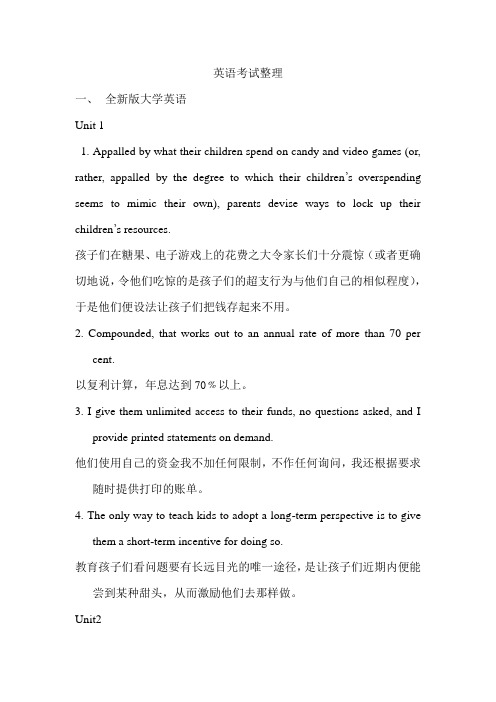
英语考试整理一、全新版大学英语Unit 11. Appalled by what their children spend on candy and video games (or, rather, appalled by the degree to which their children’s overspending seems to mimic their own), parents devise ways to lock up their children’s resources.孩子们在糖果、电子游戏上的花费之大令家长们十分震惊(或者更确切地说,令他们吃惊的是孩子们的超支行为与他们自己的相似程度),于是他们便设法让孩子们把钱存起来不用。
2. Compounded, that works out to an annual rate of more than 70 percent.以复利计算,年息达到70﹪以上。
3. I give them unlimited access to their funds, no questions asked, and Iprovide printed statements on demand.他们使用自己的资金我不加任何限制,不作任何询问,我还根据要求随时提供打印的账单。
4. The only way to teach kids to adopt a long-term perspective is to givethem a short-term incentive for doing so.教育孩子们看问题要有长远目光的唯一途径,是让孩子们近期内便能尝到某种甜头,从而激励他们去那样做。
Unit21.I think that skill with one’s own hands------whether it’s tilling the soil,building a house, making a piece of furniture, playing a violin or painting a painting a painting------is something that doesn’t change with the ups and downs of life.我认为手艺——不管是耕地,造房子,做家具,拉小提琴,还是画图——这些东西不会因生活的起起落落而改变。
2023年大学英语AB级考试重点词汇复习
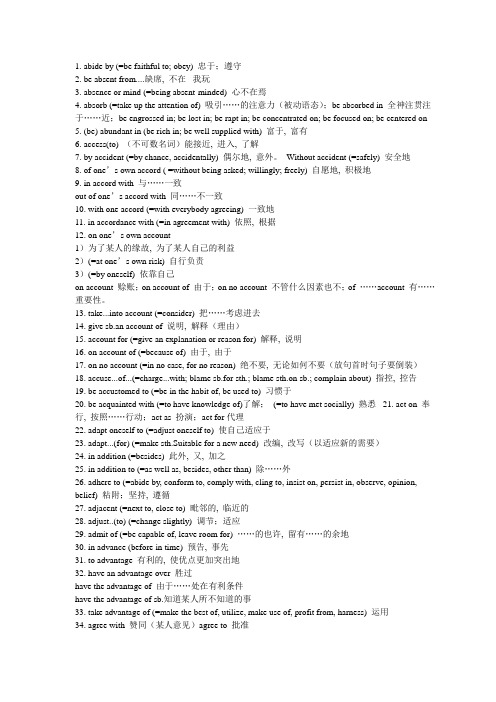
1. abide by (=be faithful to; obey) 忠于;遵守2. be absent from....缺席, 不在我玩3. absence or mind (=being absent-minded) 心不在焉4. absorb (=take up the attention of) 吸引……的注意力(被动语态);be absorbed in 全神注贯注于……近;be engrossed in; be lost in; be rapt in; be concentrated on; be focused on; be centered on5. (be) abundant in (be rich in; be well supplied with) 富于, 富有6. access(to) (不可数名词)能接近, 进入, 了解7. by accident (=by chance, accidentally) 偶尔地, 意外。
Without accident (=safely) 安全地8. of one’s own accord ( =without being asked; willingly; freely) 自愿地, 积极地9. in accord with 与……一致out of one’s accord with 同……不一致10. with one accord (=with everybody agreeing) 一致地11. in accordance with (=in agreement with) 依照, 根据12. on one’s own account1)为了某人的缘故, 为了某人自己的利益2)(=at one’s own risk) 自行负责3)(=by oneself) 依靠自己on account 赊账;on account of 由于;on no account 不管什么因素也不;of ……account 有……重要性。
大一大学英语期末考试重点单词
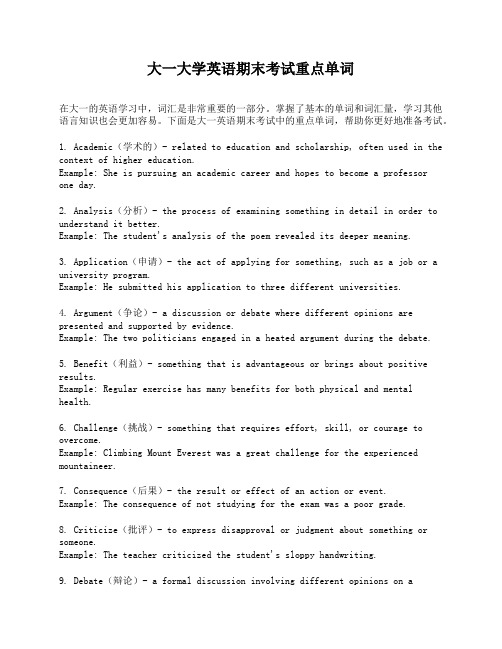
大一大学英语期末考试重点单词在大一的英语学习中,词汇是非常重要的一部分。
掌握了基本的单词和词汇量,学习其他语言知识也会更加容易。
下面是大一英语期末考试中的重点单词,帮助你更好地准备考试。
1. Academic(学术的)- related to education and scholarship, often used in the context of higher education.Example: She is pursuing an academic career and hopes to become a professorone day.2. Analysis(分析)- the process of examining something in detail in order to understand it better.Example: The student's analysis of the poem revealed its deeper meaning.3. Application(申请)- the act of applying for something, such as a job or a university program.Example: He submitted his application to three different universities.4. Argument(争论)- a discussion or debate where different opinions are presented and supported by evidence.Example: The two politicians engaged in a heated argument during the debate.5. Benefit(利益)- something that is advantageous or brings about positive results.Example: Regular exercise has many benefits for both physical and mental health.6. Challenge(挑战)- something that requires effort, skill, or courage to overcome.Example: Climbing Mount Everest was a great challenge for the experienced mountaineer.7. Consequence(后果)- the result or effect of an action or event.Example: The consequence of not studying for the exam was a poor grade.8. Criticize(批评)- to express disapproval or judgment about something or someone.Example: The teacher criticized the student's sloppy handwriting.9. Debate(辩论)- a formal discussion involving different opinions on aparticular topic.Example: The debate on climate change was lively and informative.10. Evaluate(评估)- to assess or judge the value, importance, or quality of something.Example: The professor asked the students to evaluate each other's presentations.11. Evidence(证据)- facts, information, or data used to support a claim or argument.Example: The detective collected evidence at the crime scene to solve the case.12. Global(全球的)- relating to the whole world, encompassing or affecting everyone.Example: Climate change is a global issue that requires international cooperation.13. Innovate(创新)- to introduce new ideas, methods, products, etc. to improve or make changes.Example: The company prided itself on its ability to innovate and stay aheadof the competition.14. Objective(客观的)- not influenced by personal feelings or opinions; based on facts.Example: The reporter tried to present the news in an objective and unbiased manner.15. Perspective(观点)- a particular way of thinking about or viewing something; point of view.Example: The author's novel offers a unique perspective on love and relationships.16. Promote(促进)- to help or encourage the growth or development of something.Example: The company used social media to promote its new product.17. Research(研究)- the systematic investigation into and study of materials and sources to establish facts and reach new conclusions.Example: The scientist spent years conducting research on cancer treatments.18. Source(来源)- a person, place, or thing from which something comes or isobtained.Example: The historian relied on primary sources such as letters and diariesfor her research.19. Theory(理论)- an explanation or idea that is supported by evidence and used to explain a particular set of phenomena.Example: Einstein's theory of relativity revolutionized our understanding of physics.20. Value(价值)- the importance, worth, or usefulness of something. Example: The company prides itself on delivering high-value products to its customers.21. Wisdom(智慧)- the ability to think and act using knowledge, experience, understanding, common sense, and insight.Example: The elderly man shared his wisdom with the young people in the village.22. Xenophobia(仇外)- a deep rooted fear or hatred of foreigners or anything that is strange or foreign.Example: The community worked hard to combat xenophobia and promote tolerance.23. Youth(青春)- the period between childhood and adulthood, also refers to people who are young.Example: The non-profit organization focuses on providing education and opportunities for youth in underprivileged areas.24. Zeal(热情)- great energy, enthusiasm, or eagerness in pursuit of an objective.Example: The volunteer's zeal to help others was an inspiration to everyone around her.25. Ability(能力)- the capacity or skill to do something.Example: The athlete's ability to run fast earned him a spot on the national team.26. Bold(大胆的)- not hesitating or fearful in the face of actual orpossible danger or rebuff; courageous and daring.Example: The entrepreneur's bold decision to invest in a new technology paid off.27. Creative(创造性的)- having the ability to create or invent something new, original, or imaginative.Example: The artist's creative use of colors and textures made her paintings famous.28. Diversity(多样性)- the state of being diverse; variety or multiformity. Example: The university values diversity and encourages students fromdifferent backgrounds to apply.29. Effort(努力)- the exertion of physical or mental power to do something. Example: It takes a lot of effort to learn a new language.30. Freedom(自由)- the state of being free or at liberty to act, speak, or think as one wants without any constraints.Example: The country's constitution guarantees freedom of speech and expression.31. Genius(天才)- an exceptional natural capacity of intellect, especiallyas shown in creative and original work in science, art, music, etc.Example: Mozart was a musical genius who composed his first symphony at theage of eight.32. Happiness(幸福)- the state of being happy and the feeling that comesover you when you know life is good and you can't help but smile.Example: Spending time with friends and family brings me happiness.33. Integrity(正直)- the quality of being honest and having strong moral principles; moral uprightness.Example: The politician's integrity and honesty made her a role model for many.34. Justice(正义)- the quality of being just, fair, and impartial.Example: The judge's role is to ensure that justice is served in the courtroom.35. Knowledge(知识)- facts, information, and skills acquired by a person through experience or education; the theoretical or practical understanding of a subject.Example: The professor's knowledge of ancient history was extensive and impressive.36. Leadership(领导)- the action of leading an organization or group of people.Example: The team's success was due to the coach's strong leadership and guidance.37. Motivation(动机)- the reason or reasons one has for acting or behavingin a particular way.Example: The athlete's motivation to win the gold medal pushed him to train harder than ever before.38. Optimism(乐观)- hopefulness and confidence about the future or the successful outcome of something.Example: The entrepreneur's optimism about the new business venture inspired her team to work harder.39. Patience(耐心)- the capacity to accept or tolerate delay, problems, or suffering without becoming annoyed or anxious.Example: The teacher's patience with her students helped them learn and grow.40. Quality(质量)- the standard of something as measured against otherthings of a similar kind; the degree of excellence of something.Example: The company's commitment to quality ensures that its products are reliable and durable.41. Respect(尊重)- a feeling of deep admiration for someone or something elicited by their abilities, qualities, or achievements.Example: The students showed respect to their teacher by listening attentively in class.42. Success(成功)- the accomplishment of an aim or purpose.Example: The entrepreneur's hard work and determination led to the success of his business.43. Talent(才能)- natural aptitude or skill.Example: The young actress's talent shone on stage, earning her a standing ovation.44. Understanding(理解)- the ability to comprehend something.Example: The therapist's understanding of human behavior helped her patients overcome their challenges.45. Vision(愿景)- the ability to think about or plan the future with imagination or wisdom.Example: The company's vision is to become the world's leading provider ofeco-friendly products.46. Willpower(意志力)- the strength of will to carry out one's decisions, wishes, or plans.Example: The athlete's willpower helped him break the world record in the marathon.47. eXEMPLARY(模范的)- serving as a commendable pattern or example. Example: The teacher's exemplary behavior inspired her students to strive for excellence.48. Yield(产量)- the amount of agricultural produce harvested from a piece of land.Example: The farmer increased the yield of his crops by using advanced farming techniques.49. Zealot(狂热者)- a person who is fanatical and uncompromising in pursuit of their religious, political, or other ideals.Example: The zealot's passionate beliefs led him to join a radical political group.50. Advocate(提倡者)- a person who puts a case on behalf of someone else or the cause of something.Example: The advocate fought for the rights of the marginalized and underrepresented groups in society.51. Benevolence(仁慈)- the quality of being well meaning; kindness. Example: The billionaire's benevolence was evident in his numerous charitable donations.52. Charity(慈善)- the voluntary giving of help, typically in the form of money, to those in need.Example: The charity organization provided food and shelter for the homeless during the winter months.53. Dedication(奉献)- the quality of being dedicated or committed to a task or purpose.Example: The doctor's dedication to her patients was evident in her long hours and compassionate care.54. Enthusiasm(热情)- intense and eager enjoyment, interest, or approval. Example: The coach's enthusiasm for the game inspired his players to givetheir best.55. Forgiveness(宽恕)- the action or process of forgiving or being forgiven. Example: The victim's forgiveness of her attacker led to a remarkable reconciliation.56. Generosity(慷慨)- the quality of being generous; readiness to give more of something, especially money, than is strictly necessary or expected. Example: The philanthropist's generosity provided scholarships for underprivileged students to attend college.57. Hope(希望)- a feeling of expectation and desire for a certain thing to happen.Example: The patient's hope for a cure gave her the strength to fight her illness.58. Idealism(理想主义)- the pursuit of high or noble principles, goals, or standards.Example: The idealism of the young activist pushed her to fight for social justice and equality.59. Justice(正义)- the quality of being just, fair, and impartial.Example: The judge's role is to ensure that justice is served in the courtroom.60. Kindness(善良)- the quality of being gentle, caring, and considerate. Example: The neighbor's kindness was evident in her willingness to help others in need.61. Liberty(自由)- the state of being free or at liberty to act, speak, or think as one wants without any constraints.Example: The country's constitution guarantees freedom of speech and expression.62. Mercy(仁慈)- compassion or forgiveness shown towards someone whom it is within one's power to punish or harm.Example: The ruler's mercy spared the lives of the captured soldiers.63. Nobility(高贵)- the quality of being noble in character; moral excellence.Example: The nobleman's reputation for honesty and integrity was well-known in the community.64. Optimism(乐观)- hopefulness and confidence about the future or the successful outcome of something.Example: The entrepreneur's optimism about the new business venture inspired her team to work harder.65. Patience(耐心)- the capacity to accept or tolerate delay, problems, or suffering without becoming annoyed or anxious.Example: The teacher's patience with her students helped them learn and grow.66. Quality(质量)- the standard of something as measured against other things of a similar kind; the degree of excellence of something.Example: The company's commitment to quality ensures that its products are reliable and durable.这些单词是大一英语期末考试中的重点。
大一英语口语知识点总结

大一英语口语知识点总结在大一的英语学习中,口语是一项重要的能力。
下面是一些大一英语口语知识点的总结,以帮助学生提高他们的口语表达能力。
一、日常交流用语1.问候与回应- 问候:Hello! Hi! How are you? How are you doing? What's up?- 回应:I'm fine, thank you. I'm good. Not bad. I'm great.2.自我介绍- 表示自己的名字:My name is…- 描述自己的年龄和国籍:I'm … years old. I'm from…- 指出个人特征:I'm tall/short, thin/fat, etc.- 描述个人兴趣爱好:I like/love/enjoy playing sports, music, etc.3.问路和指路- 问路:Excuse me, can you tell me how to get to…?- 指路:Sure! Go straight and turn left/right. It's on the left/right.4.借用物品- 借用:Can I borrow your pen, book, etc.?- 归还:Here you are. Thank you.二、日常生活话题1.购物- 需要帮助:Excuse me, could you help me find…?- 尺寸和颜色:Do you have this in size small/large? Can I try it on?- 付款:How much does it cost? Can I pay by cash/card?2.餐厅- 订餐:I'd like to make a reservation for… people at… o'clock.- 点菜:I'll have the beef/pasta/soup, please.- 付款:Could I have the bill, please? Can I pay with a credit card?3.旅行- 订票:I'd like to book a flight/train ticket to…三、日常活动和爱好1.运动- 询问是否爱好运动:Do you play any sports?- 描述自己的喜好:I love playing soccer/basketball/tennis.- 询问他人的观点:What do you think of…?2.音乐- 询问是否喜欢音乐:Do you like music?- 描述自己的喜好:I enjoy listening to pop/rock/classical music.- 提出建议:You should listen to this band/singer. They're really good.3.电影- 询问是否喜欢电影:Do you like movies?- 推荐电影:You should watch this movie. It's reallyfunny/interesting.四、学习和工作1.询问关于学习或工作的问题- 询问学习专业:What is your major?2.描述自己的学习或工作情况- 描述工作内容:I work as a waiter/teacher/programmer, etc.3.询问建议- 询问学习建议:Can you give me some study tips?- 询问职业建议:What advice do you have for someone who wants to work in your field?五、社交和交友1.结交新朋友- 打招呼并自我介绍:Hi, I'm… Nice to meet you.- 问候对方并问问题:How are you? Where are you from?2.舒适地交流- 共同兴趣:I see that we both like… What's your favorite…?- 提出活动建议:Would you like to…? Let's… How about…?3.道别- 道别:Goodbye. See you later/soon. Take care. Have a nice day.以上是大一英语口语知识点的总结,涵盖了日常交流、日常生活话题、日常活动和爱好、学习和工作以及社交和交友等方面,希望对大一学生提高口语表达能力有所帮助。
大学英语期末考试翻译考试重点
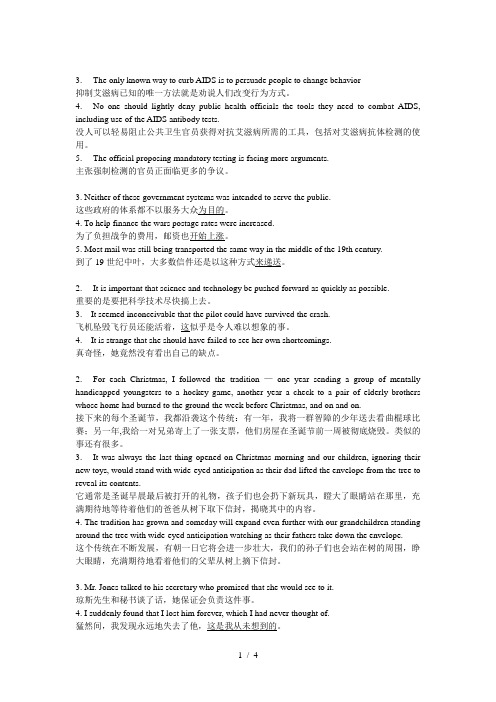
3. The only known way to curb AIDS is to persuade people to change behavior抑制艾滋病已知的唯一方法就是劝说人们改变行为方式。
4. No one should lightly deny public health officials the tools they need to combat AIDS, including use of the AIDS antibody tests.没人可以轻易阻止公共卫生官员获得对抗艾滋病所需的工具,包括对艾滋病抗体检测的使用。
5. The official proposing mandatory testing is facing more arguments.主张强制检测的官员正面临更多的争议。
3. Neither of these government systems was intended to serve the public.这些政府的体系都不以服务大众为目的。
4. To help finance the wars postage rates were increased.为了负担战争的费用,邮资也开始上涨。
5. Most mail was still being transported the same way in the middle of the 19th century.到了19世纪中叶,大多数信件还是以这种方式来递送。
2. It is important that science and technology be pushed forward as quickly as possible.重要的是要把科学技术尽快搞上去。
3. It seemed inconceivable that the pilot could have survived the crash.飞机坠毁飞行员还能活着,这似乎是令人难以想象的事。
大一英语一般考什么知识点
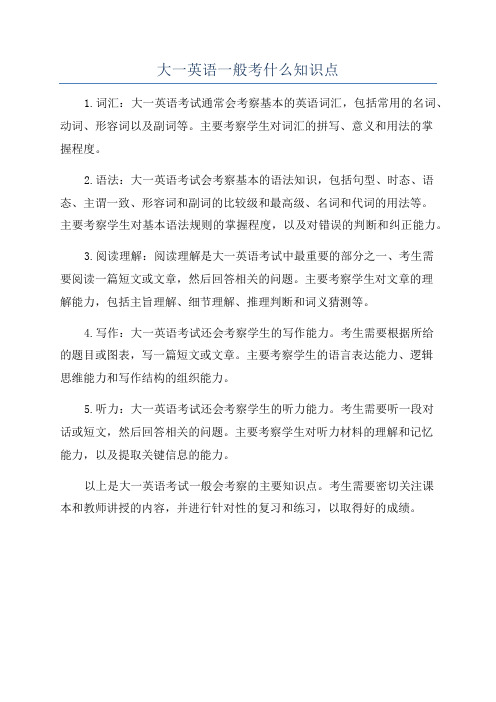
大一英语一般考什么知识点
1.词汇:大一英语考试通常会考察基本的英语词汇,包括常用的名词、动词、形容词以及副词等。
主要考察学生对词汇的拼写、意义和用法的掌
握程度。
2.语法:大一英语考试会考察基本的语法知识,包括句型、时态、语态、主谓一致、形容词和副词的比较级和最高级、名词和代词的用法等。
主要考察学生对基本语法规则的掌握程度,以及对错误的判断和纠正能力。
3.阅读理解:阅读理解是大一英语考试中最重要的部分之一、考生需
要阅读一篇短文或文章,然后回答相关的问题。
主要考察学生对文章的理
解能力,包括主旨理解、细节理解、推理判断和词义猜测等。
4.写作:大一英语考试还会考察学生的写作能力。
考生需要根据所给
的题目或图表,写一篇短文或文章。
主要考察学生的语言表达能力、逻辑
思维能力和写作结构的组织能力。
5.听力:大一英语考试还会考察学生的听力能力。
考生需要听一段对
话或短文,然后回答相关的问题。
主要考察学生对听力材料的理解和记忆
能力,以及提取关键信息的能力。
以上是大一英语考试一般会考察的主要知识点。
考生需要密切关注课
本和教师讲授的内容,并进行针对性的复习和练习,以取得好的成绩。
大学英语-学术英语考试A篇重点句子
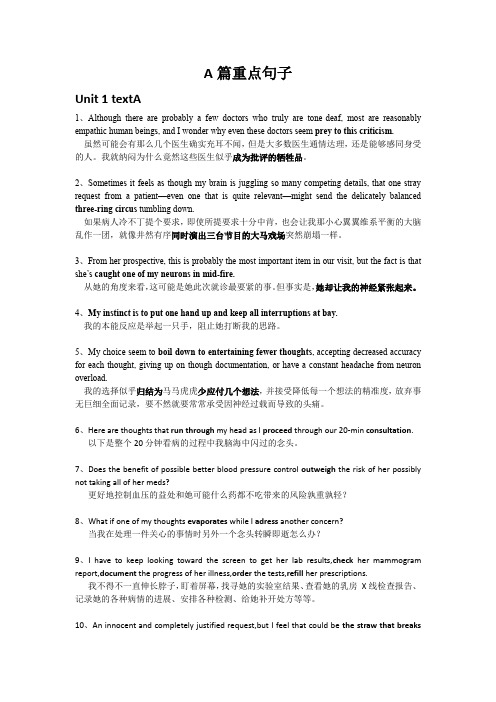
A篇重点句子Unit 1 textA1、Although there are probably a few doctors who truly are tone-deaf, most are reasonably empathic human beings, and I wonder why even these doctors seem prey to this criticism.虽然可能会有那么几个医生确实充耳不闻,但是大多数医生通情达理,还是能够感同身受的人。
我就纳闷为什么竟然这些医生似乎成为批评的牺牲品。
2、Sometimes it feels as though my brain is juggling so many competing details, that one stray request from a patient—even one that is quite relevant—might send the delicately balanced three-ring circus tumbling down.如果病人冷不丁提个要求,即使所提要求十分中肯,也会让我那小心翼翼维系平衡的大脑乱作一团,就像井然有序同时演出三台节目的大马戏场突然崩塌一样。
3、From her prospective, this is probably the most important item in our visit, but the fact is that she’s caught one of my neurons in mid-fire.从她的角度来看,这可能是她此次就诊最要紧的事。
但事实是,她却让我的神经紧张起来。
4、My instinct is to put one hand up and keep all interruptions at bay.我的本能反应是举起一只手,阻止她打断我的思路。
大学英语口语期末考试题(大一下学期)

Topics For Oral Test1. .What are the advantages and disadvantages of being an au pair girl? What kind of family would you like to be with?2. Do you think divorce is a right solution to an unhappy marriage? Why? What could be reasons for causing divorce?3. What are the causes of sex discrimination? What do you think of it? What can we do to solve the problem of sex discrimination?4. Say something about Australia, the United States and Kenya according to “Seeing the World”.5. Retell Text B in Lesson 13 in your own words. In your opinion, what can we do to help those people who cannot sleep well at night?6. Sum up your own study habits in a few points and tell how to improve them.7. Retell Text A in lesson 18 “How to keep fit” in your own words and tell how to keep fit in a few points.8. What does friendship mean to you? In your opinion, what kind of friend could be regarded as a real friend? What do you think is the difference between friendship and love?9. Retell the story of Zhou Chenhu in the text “All For a Son” in your own words. And what have you learned from the story?10. How do you explain the strong desire for a son among so many Chinese both old andyoung? Do you support “more sons and more happiness”? What’s your opinion on family planning policy in China?11. Retell Text A in Lesson 25 in your own words. Which people need us to offer a seaton a bus?12. Would you give up your seat if an old man (woman) was standing by you on a bus?Why (Why not)? Please describe one of your experiences on a very crowded bus.13. Suppose you are now in a Western country and invited to give a talk about (1) theDragon Boat Festival (2) the Spring Festival14. Do you think you are a “lucky dog” being a student of English? Why (Why not)?What advantages could we have if we can speak a foreign language?15. Tell how foreigners celebrate Christmas Day and tell us the differences andsimilarities between Christmas and the Spring Festival.。
全新版大学英语第二版2答案及期末考试复习资料(针对武汉理工大学大一下英语期末考试)

Unit1Part Three: ClozeIs there a contrast between learning styles in China and the West While we should be careful to avoid exaggerating the differences, they do appear to exist. In China, for example, greater priority is given to developing skills at an early age. The Americans, on the other hand , place more emphasis on promoting creativity in young children, leaving them to pick upskills later. American parents tend to avoid rushing in to assist their children as they try to accomplish a task, thinking itbetter that children should learn to solve problems by themselves. Such an approach can, on occasion , be mistaken forneglecting one’s parental duties by those more used to “teaching by holding the hand.”Both approaches have their disadvantages as well as advantages, and it may well be worthwhile to search for a superior method that would combinethe best of both worlds.-------Theme-relatedThe real challenge to us teacher is combining the best of both worlds into one . Creativity and basic skills need to be considered in terms of being means to an [end] , rather than simply as ends in themselves . Some Chinese students may not [perform] well in hypothetical settings ,but when it comes to [facing] real life challenges and issues ,they are more than [competent] in resolving most of them, [equipped] as they are with their strong skill .The . system may be [designed] to aim more at producing top of the cream students ,but that [approach] may do damage to the big bulk of the [rest] of the student body .The Chinese education system is [definitely] not perfect ,but it does produce a [quality] workforce ,And I truly believe that solid basic knowledge/skill focus is the single biggest force driving the rise of Chinese as a country .翻译:背叛传统需要极大的勇气。
大一英语七单元知识点总结

大一英语七单元知识点总结Unit 7: Health and Medical CareIn Unit 7, we have learned various aspects related to health and medical care. This unit covers topics such as illnesses, medical treatments, healthy lifestyle choices, and the importance of physical activity. Let's summarize the key points we have learned.Vocabulary:1. Illnesses and Symptoms- Common illnesses: cold, flu, headache, stomachache, etc.- Symptoms: fever, cough, sore throat, runny nose, etc.2. Medical Professionals- Doctor, nurse, surgeon, dentist, pharmacist, etc.3. Medical Facilities and Equipment- Hospital, clinic, pharmacy, ambulance, stethoscope, thermometer, etc.4. Medical Treatments and Procedures- Prescribe, diagnose, examine, take an X-ray, have surgery, etc.Grammar:1. Present Simple vs. Present Continuous- Present simple: general truths, habits, routines- Present continuous: actions happening at the moment of speaking2. Modal Verbs for Advice and Obligation- Should, shouldn't, must, mustn't, have to3. Comparative and Superlative Adjectives- Comparative: adding -er or using "more"- Superlative: adding -est or using "most"4. Passive Voice- Subject + be + past participle5. Expressing Cause and Effect- Because, as a result, so, therefore, due to, etc.Useful Expressions and Phrases:1. Expressing Symptoms and Illnesses- I have a headache and a runny nose.- I feel dizzy and have a high temperature.2. Giving Advice and Making Suggestions- You should take some medicine and get plenty of rest.- Why don't you see a doctor if the pain persists?3. Describing Healthy Lifestyle Choices- It is important to eat a balanced diet and exercise regularly. - Avoid smoking and limit your intake of sugary drinks.4. Talking about Medical Treatments and Procedures- The doctor prescribed some antibiotics for my infection.- I had surgery to remove my wisdom teeth.5. Discussing the Importance of Physical Activity- Regular exercise helps maintain a healthy weight and reduces the risk of heart disease.- Physical activity releases endorphins, which improve mood and mental well-being.In conclusion, Unit 7 has provided us with a comprehensive understanding of health and medical care. From learning about common illnesses and their symptoms to discussing healthy lifestyle choices and medical treatments, we have developed essential knowledge and vocabulary related to this topic. Remember to practice using the grammar structures and expressions we have covered in order to confidently communicate about health and medical matters in English.。
大学英语大一期末考试重点单词
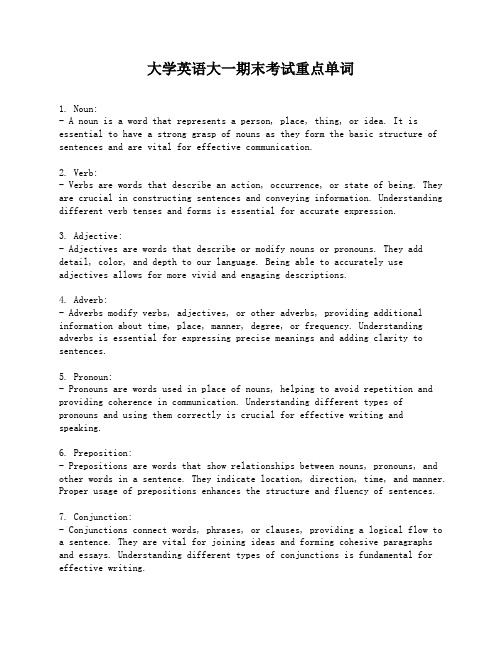
大学英语大一期末考试重点单词1. Noun:- A noun is a word that represents a person, place, thing, or idea. It is essential to have a strong grasp of nouns as they form the basic structure of sentences and are vital for effective communication.2. Verb:- Verbs are words that describe an action, occurrence, or state of being. They are crucial in constructing sentences and conveying information. Understanding different verb tenses and forms is essential for accurate expression.3. Adjective:- Adjectives are words that describe or modify nouns or pronouns. They add detail, color, and depth to our language. Being able to accurately use adjectives allows for more vivid and engaging descriptions.4. Adverb:- Adverbs modify verbs, adjectives, or other adverbs, providing additional information about time, place, manner, degree, or frequency. Understanding adverbs is essential for expressing precise meanings and adding clarity to sentences.5. Pronoun:- Pronouns are words used in place of nouns, helping to avoid repetition and providing coherence in communication. Understanding different types of pronouns and using them correctly is crucial for effective writing and speaking.6. Preposition:- Prepositions are words that show relationships between nouns, pronouns, and other words in a sentence. They indicate location, direction, time, and manner. Proper usage of prepositions enhances the structure and fluency of sentences.7. Conjunction:- Conjunctions connect words, phrases, or clauses, providing a logical flow to a sentence. They are vital for joining ideas and forming cohesive paragraphs and essays. Understanding different types of conjunctions is fundamental for effective writing.8. Interjection:- Interjections are words used to express strong emotions or sudden reactions. While they are not essential for basic communication, they add depth and emphasis to language. Being aware of interjections enhances one's ability to convey emotions accurately.9. Synonyms:- Synonyms are words that have similar meanings. Knowing synonyms allows for variation in language usage, making written and spoken communication more engaging and sophisticated.10. Antonyms:- Antonyms are words that have opposite meanings. Understanding antonyms helps in expanding vocabulary and expressing nuances in communication.11. Collocations:- Collocations are words that frequently appear together due to their semantic associations. Learning collocations helps in using appropriate word combinations, leading to natural and accurate language usage.12. Idioms:- Idioms are phrases or expressions that have figurative meanings, often not deducible from their literal interpretation. They add color and creativity to language. Understanding idioms is crucial for understanding and effectively using idiomatic expressions in communication.13. Phrasal Verbs:- Phrasal verbs are combinations of a verb and a preposition or adverb that create a new meaning. They are common in spoken English and are essential for understanding native speakers and colloquial language.14. Prefixes:- Prefixes are added to the beginning of words to change their meaning or create new words. Understanding prefixes can help in deciphering the meaning of unfamiliar words and expanding vocabulary.15. Suffixes:- Suffixes are added to the end of words to change their meaning or create new words. Like prefixes, suffixes are important for word analysis and vocabulary development.16. Homophones:- Homophones are words that sound the same but have different meanings and often different spellings. Recognizing homophones is key to avoiding confusion and using words correctly.17. Homographs:- Homographs are words that are spelled the same but have different meanings and sometimes different pronunciations. Understanding homographs helps in interpreting text and using words appropriately.18. Homonyms:- Homonyms are words that are spelled and pronounced the same but havedifferent meanings. Being able to distinguish homonyms is important for clear and precise communication.19. Active Voice:- Active voice is a grammatical voice in which the subject performs the action expressed by the verb. Using active voice generally creates clearer and more direct sentences.20. Passive Voice:- Passive voice is a grammatical voice in which the subject is acted upon by the verb. Passive voice is used when the focus is on the action rather thanthe doer or when the doer is unknown or not important.21. Clauses:- Clauses are groups of words that contain a subject and a verb. Understanding different types of clauses (e.g., main clauses, subordinate clauses) is essential for constructing complex sentences and expressing detailed ideas. 22. Phrases:- Phrases are groups of words that function as a unit within a sentence. They do not contain a subject and a verb. Learning about different types of phrases (e.g., noun phrases, verb phrases) helps in sentence construction and vocabulary development.23. Syntax:- Syntax refers to the rules governing the structure of sentences in a language. Understanding syntax is crucial for creating coherent and grammatically correct sentences.24. Punctuation:- Punctuation marks are symbols used in writing to separate sentences, clauses, and phrases, indicating pauses, tone, and emphasis. Proper punctuation is essential for clear and effective written communication.25. Spelling:- Spelling is the correct arrangement of letters in a word. Good spellingskills are important for clear and professional communication, both in written and digital forms.26. Vocabulary:- Vocabulary refers to the words and phrases known and used by a person. Expanding one's vocabulary is key to effective communication and comprehension.27. Grammar:- Grammar is the system of rules that govern the structure and use of a language. A strong understanding of grammar is essential for speaking and writing correctly and coherently.28. Listening:- Listening is the ability to accurately receive and interpret spoken language. Developing strong listening skills is crucial for understanding others and learning from auditory sources.29. Speaking:- Speaking is the ability to convey information, ideas, and feelings by using spoken language. Good speaking skills are important for effective communication and expression.30. Reading:- Reading is the process of interpreting written language. Developing strong reading skills is essential for comprehension, learning, and gathering information.31. Writing:- Writing is the ability to express thoughts, ideas, and information inwritten form. Strong writing skills are important for effective communication, academic success, and professional advancement.Conclusion:By focusing on and mastering these key vocabulary words, students can significantly improve their English language skills. These words form the foundation for effective communication in reading, writing, listening, and speaking. Regular practice and usage of these words will enhance both fluency and accuracy in English proficiency. Therefore, it is essential for studentsto dedicate time and effort to building a solid vocabulary base as they progress through their college English studies.。
大学英语专业 简明英语测试教程 重点

考试信度:考分的一致性。
考试效度:考试达到其预期测试意图的程度。
直接考试:学生被要求直接运用被试的技能或能力。
间接考试:测试那些相关技能、以达到评估能力的目的。
诊断考试:此类考试旨在了解学生在某个阶段中学习上的长处与短处,其最终目的是为了给教师提供教学效果或质量方面的信息。
整体评分法:把作文视作一完整的篇章,根据对其总体印象打分。
原始分数:未经处理或未加权重的分数。
考试:用来获取某些行为的方法,其目的是从这些行为中推断出个人具有的某些特征。
交互性:指在考试所设计的任务中学生的参与程度。
1.根据考试的方式,考试的分类:1直接考试(①侧重考试形式的真实性②便于从总体上考查产出性技能,如口语能力、写作能力、翻译能力等③从命题人员的角度出发,直接考试具有比较明确的测试目标)2间接考试(①不强调考试形式上的真实性,即考试形式无需与实际语用环境相一致②由于不受语用环境的限制,所选择测试的技能可以更具有代表性和概括性③间接考试可选用多项选择题型,可以提高考试信度。
)2.常用的口试形式及特点:①朗读:学生事先在规定时间里浏览朗读材料,然后朗读。
材料的长度视考试难度或学生水平而定,可以是单句,也可以是段落。
但是,朗读作为口试形式只测试学生的语音语调等,无法检查整体口语能力。
②看图说话:给学生一幅或多幅图片,让他们描绘或叙述图中所发生的事件。
③简短说话:是一种弹性口试形式,即在难度上有伸缩性,可以是一个三言两语的形式,也可以是一个时间较长的形式。
④对话:在一个假设情景中进行,学生之间或学生与考官之间根据情景要求进行对话。
对话者既要运用一些常用会话技能,同时还要运用解决沟通问题的技能。
⑤小组讨论:学生们就一个话题展开交流,一般控制在三四个人左右。
⑥面试型口试:基本上采取问答形式,但又不同于简单的一问一答形式。
考官通过各种提问技巧,从多个层面来观察学生的口语能力。
3.如何评阅作文,特点?⑴整体评分法①节省评阅时间②阅卷人员注重作文的整体质量③它的问题主要表现在阅卷人员对标准的理解和掌握上,以及所定档次标准瑜现实作文之间的吻合性。
大学英语期末考试重点单词
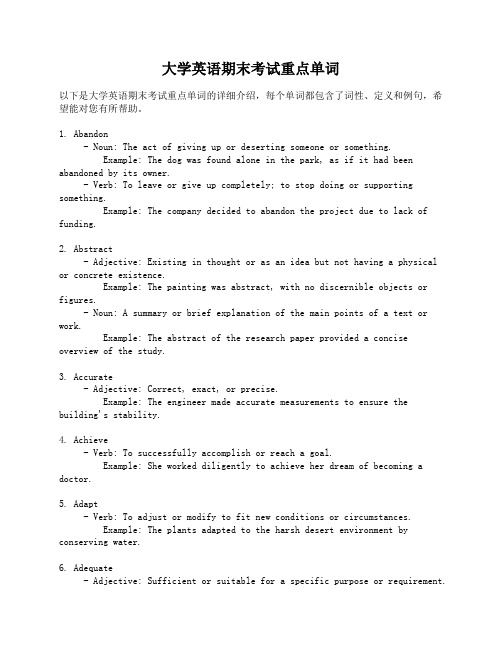
大学英语期末考试重点单词以下是大学英语期末考试重点单词的详细介绍,每个单词都包含了词性、定义和例句,希望能对您有所帮助。
1. Abandon- Noun: The act of giving up or deserting someone or something.Example: The dog was found alone in the park, as if it had been abandoned by its owner.- Verb: To leave or give up completely; to stop doing or supporting something.Example: The company decided to abandon the project due to lack of funding.2. Abstract- Adjective: Existing in thought or as an idea but not having a physical or concrete existence.Example: The painting was abstract, with no discernible objects or figures.- Noun: A summary or brief explanation of the main points of a text or work.Example: The abstract of the research paper provided a concise overview of the study.3. Accurate- Adjective: Correct, exact, or precise.Example: The engineer made accurate measurements to ensure thebuilding's stability.4. Achieve- Verb: To successfully accomplish or reach a goal.Example: She worked diligently to achieve her dream of becoming a doctor.5. Adapt- Verb: To adjust or modify to fit new conditions or circumstances.Example: The plants adapted to the harsh desert environment by conserving water.6. Adequate- Adjective: Sufficient or suitable for a specific purpose or requirement.Example: The small apartment was adequate for a single person.7. Advocate- Noun: A person who publicly supports or recommends a particular causeor policy.Example: The environmental advocate campaigned for stricter regulations on pollution.- Verb: To publicly support or recommend a particular cause or policy.Example: The organization advocates for equal rights for all individuals.8. Ambiguous- Adjective: Open to more than one interpretation; unclear or uncertain.Example: The ambiguous statement left the audience confused about the speaker's intention.9. Analysis- Noun: The examination and interpretation of data or information.Example: The data analysis revealed interesting trends and patterns.10. Anticipate- Verb: To expect or predict something will happen and be prepared for it.Example: The team anticipated an increase in sales during the holiday season.11. Appropriate- Adjective: Suitable or correct for a particular situation or occasion.Example: The formal attire was appropriate for the black-tie event.- Verb: To take or use something without permission, often for personal gain.Example: The employee was accused of appropriating company funds for personal use.12. Articulate- Adjective: Expressing thoughts, ideas, or feelings clearly and effectively.Example: The professor was articulate in explaining complex concepts.- Verb: To express or formulate an idea or feeling clearly.Example: The student articulated his concerns about the school's policies.13. Aspire- Verb: To have a strong desire for achievement or distinction.Example: She aspired to become a renowned author.14. Assert- Verb: To state or express something confidently and forcefully.Example: The politician asserted his innocence in the face of the allegations.15. Assess- Verb: To evaluate or judge the nature, quality, or ability of someoneor something.Example: The teacher assessed the students' understanding through a series of quizzes.16. Assign- Verb: To allocate or designate someone or something for a specific task or purpose.Example: The manager assigned the project to the most experienced team member.17. Assume- Verb: To take for granted or suppose something to be true without验证.Example: The detective assumed the suspect's innocence until proven guilty.18. Assess- Verb: To evaluate or judge the nature, quality, or ability of someoneor something.Example: The teacher assessed the students' understanding through a series of quizzes.19. Attribute- Noun: A quality or feature belonging to or characteristic of someone or something.Example: Creativity is an important attribute for a successful artist.- Verb: To regard something as resulting from a particular cause or source.Example: The success of the business was attributed to the hard work and dedication of its employees.20. Authentic- Adjective: Genuine or original; not false or copied.Example: The painting was an authentic masterpiece by a famous artist.21. Autonomy- Noun: The ability to make one's own decisions and act independently.Example: The company granted autonomy to its employees, allowing them to work flexibly.22. Aversion- Noun: A strong feeling of dislike or opposition towards someone or something.Example: He had an aversion to heights and avoided tall buildings. 23. Awe- Noun: A feeling of reverential respect or fear mixed with wonder and amazement.Example: The audience was in awe of the performer's incredible talent.24. Backtrack- Verb: To retract or reverse a previous statement or decision.Example: The politician backtracked on his promise to lower taxes. 25. Barren- Adjective: Unable to produce offspring or crops; infertile.Example: The barren land yielded no crops for the farmers.26. Benevolent- Adjective: Showing kindness, generosity, and a desire to help others.Example: The benevolent philanthropist donated generously to charity.27. Bias- Noun: A preference or inclination that influences one's judgment or actions.Example: The judge's bias towards the plaintiff influenced the verdict.28. Blatant- Adjective: Obvious, noticeable, or done openly without shame.Example: The blatant disregard for safety regulations led to an accident.29. Bliss- Noun: A state of perfect happiness and great joy.Example: The couple experienced bliss during their honeymoon.30. Bland- Adjective: Lacking in flavor, interest, or character.Example: The meal was so bland that it barely left an impression on the taste buds.31. Boast- Verb: To talk with pride about one's achievements, possessions, or abilities.Example: He boasted about his impressive collection of vintage cars.32. Boost- Verb: To increase, enhance, or improve something.Example: The new marketing campaign boosted sales significantly.33. Bother- Verb: To cause inconvenience, trouble, or distress to someone.Example: The constant noise from the construction site bothered the neighbors.34. Brace- Verb: To prepare oneself mentally or physically for something challenging or difficult.Example: She braced herself for the difficult conversation with her boss.35. Brigade- Noun: A group of people organized for a specific purpose or task.Example: The volunteer brigade helped clean up the beach after the oil spill.36. Browse- Verb: To look through a collection of items casually and leisurely.Example: She browsed the bookstore for a new mystery novel to read.。
大一期末考试题及答案
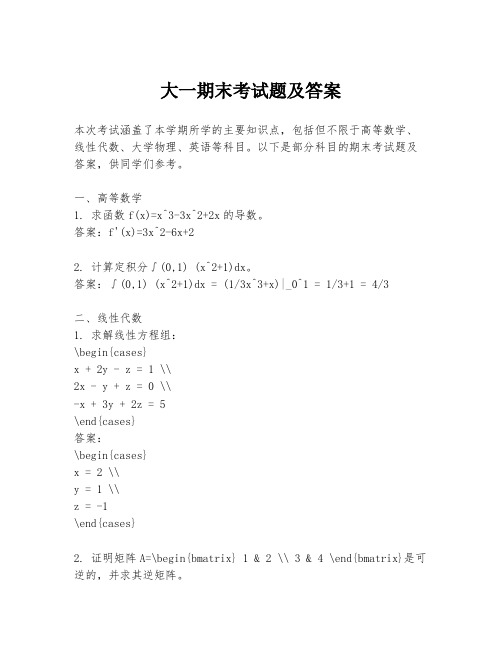
大一期末考试题及答案本次考试涵盖了本学期所学的主要知识点,包括但不限于高等数学、线性代数、大学物理、英语等科目。
以下是部分科目的期末考试题及答案,供同学们参考。
一、高等数学1. 求函数f(x)=x^3-3x^2+2x的导数。
答案:f'(x)=3x^2-6x+22. 计算定积分∫(0,1) (x^2+1)dx。
答案:∫(0,1) (x^2+1)dx = (1/3x^3+x)|_0^1 = 1/3+1 = 4/3二、线性代数1. 求解线性方程组:\begin{cases}x + 2y - z = 1 \\2x - y + z = 0 \\-x + 3y + 2z = 5\end{cases}答案:\begin{cases}x = 2 \\y = 1 \\z = -1\end{cases}2. 证明矩阵A=\begin{bmatrix} 1 & 2 \\ 3 & 4 \end{bmatrix}是可逆的,并求其逆矩阵。
答案:矩阵A的行列式为-5,因为行列式不为0,所以矩阵A是可逆的。
逆矩阵A^{-1}=\begin{bmatrix} -4/5 & 2/5 \\ 3/5 & -1/5\end{bmatrix}。
三、大学物理1. 一物体以初速度v0=10m/s沿水平方向抛出,忽略空气阻力,求物体落地时的速度大小。
答案:根据机械能守恒,物体落地时的速度大小为v=\sqrt{v0^2+2gh}=\sqrt{10^2+2*9.8*h},其中h为物体抛出的高度。
2. 一质量为m的物体在水平面上受到一恒定的拉力F作用,摩擦力为f,求物体的加速度a。
答案:根据牛顿第二定律,a=(F-f)/m。
四、英语1. Translate the following sentence into English: "随着科技的发展,人们的生活变得越来越方便。
"答案:"With the development of technology, people's lives are becoming more and more convenient."2. Fill in the blanks with the correct prepositions: He isvery interested in ________ music.答案:in以上是部分科目的期末考试题及答案,希望对同学们有所帮助。
大一大学英语题型和知识点
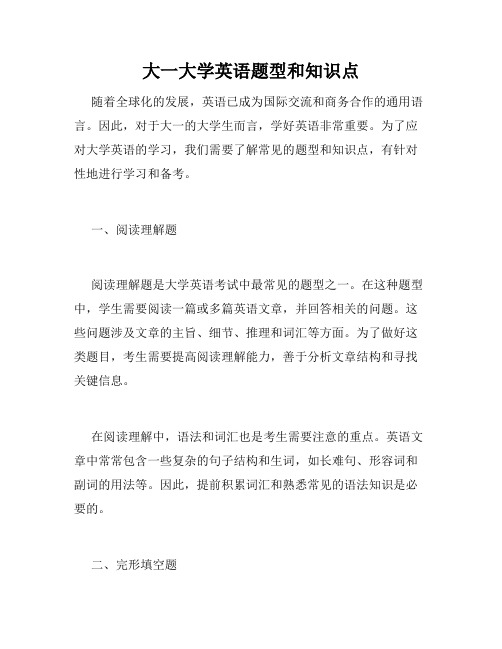
大一大学英语题型和知识点随着全球化的发展,英语已成为国际交流和商务合作的通用语言。
因此,对于大一的大学生而言,学好英语非常重要。
为了应对大学英语的学习,我们需要了解常见的题型和知识点,有针对性地进行学习和备考。
一、阅读理解题阅读理解题是大学英语考试中最常见的题型之一。
在这种题型中,学生需要阅读一篇或多篇英语文章,并回答相关的问题。
这些问题涉及文章的主旨、细节、推理和词汇等方面。
为了做好这类题目,考生需要提高阅读理解能力,善于分析文章结构和寻找关键信息。
在阅读理解中,语法和词汇也是考生需要注意的重点。
英语文章中常常包含一些复杂的句子结构和生词,如长难句、形容词和副词的用法等。
因此,提前积累词汇和熟悉常见的语法知识是必要的。
二、完形填空题完形填空是另一种常见的大学英语题型。
在这种题目中,考生需要根据短文内容,在空格中选择最佳的选项,使整篇短文通顺、连贯。
此题型要求考生具备一定的阅读理解能力和对语法的掌握。
为了做好完形填空题,考生需要注意上下文的逻辑关系,理解文章的整体意思。
此外,还要注意一些常见的语法知识点,如时态、语态和词性等。
通过练习,我们可以提高自己的完形填空答题能力。
三、听力理解题听力理解题是大学英语考试中的重要题型,通过听取英语录音,考生需要回答相关的问题。
此题型既考察听力能力,又对词汇、语法和推理能力有一定要求。
为了提高听力理解能力,考生可以多听英语材料,如听美剧、听英语新闻等。
同时,平时也要注重词汇的积累和对不同口音和语速的适应。
四、写作题写作题是大学英语考试中最具挑战性的题型之一。
在作文中,考生需要根据所给的题目或图表等进行写作,展示自己的思维逻辑和表达能力。
因此,良好的写作技巧和丰富的词汇储备是非常重要的。
在写作中,要注意句子的连贯性和段落的结构。
同时,要注重语法和拼写的准确性。
通过多写多练,我们可以提高自己的写作水平。
总结大一的大学英语学习,面临着各种题型和知识点的挑战。
除了以上提到的题型和知识点,还有词汇量、语法、口语等。
大学英语考试范围
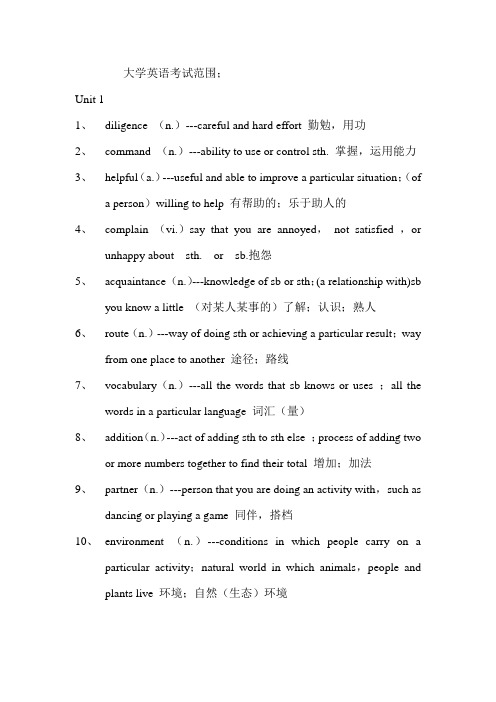
大学英语考试范围;Unit 11、diligence (n.)---careful and hard effort 勤勉,用功2、command (n.)---ability to use or control sth. 掌握,运用能力3、helpful(a.)---useful and able to improve a particular situation;(ofa person)willing to help 有帮助的;乐于助人的4、complain (vi.)say that you are annoyed,not satisfied ,orunhappy about sth. or sb.抱怨5、acquaintance (n.)---knowledge of sb or sth;(a relationship with)sbyou know a little (对某人某事的)了解;认识;熟人6、route(n.)---way of doing sth or achieving a particular result;wayfrom one place to another 途径;路线7、vocabulary(n.)---all the words that sb knows or uses ;all thewords in a particular language 词汇(量)8、addition(n.)---act of adding sth to sth else ;process of adding twoor more numbers together to find their total 增加;加法9、partner(n.)---person that you are doing an activity with,such asdancing or playing a game 同伴,搭档10、environment (n.)---conditions in which people carry on aparticular activity;natural world in which animals,people and plants live 环境;自然(生态)环境Unit 211、lung (n.)---part of the body with which one breathes 肺12、crew (n.)---group of people who work together on a ship orairplane 全体船员;全体乘务员13、steer (vt.)---make(esp. a boat or road vehicle)go in a particulardirection 为***掌舵;驾驶14、dissuade(vt.)---prevent(sb)from doing sth by reasoning 劝阻15、treacherous(a)---more dangerous than it seems 暗藏危险的;奸诈的16、contact (vt.)---get in touch with 联系,接触17、following (a.)---next ;to be mentioned immediately 接着的;下列的18、drag (vt.)---pull along with great effort 拖;拉19、adventurer(n.)---person who seeks adventures 冒险家20、being (n.)---living thing,esp. a person生物;人Unit 321、occasion (n.)---special time;time when sth happens 时刻,时机;场合22、primary (a.)---earliest;most important;fundamental 最初的;首要的;根本的;23、minor (a.)---not serious or important 较小的;次要的24、operate (vi.)---cut the body in order to set right or remove adiseased part 开刀,动手术25、spot (n.)---round area that is different from the main surface 点;斑点26、bunch (n.)---things of the same kind that are tied together(一)束;(一)串27、clatter (n.)---a number of rapid short knocking sounds 咔嗒声28、disappointment (n.)--- sadness because one does not get what onehopes for 失望29、flutter (vi.)---move quickly to and fro in air 飘动30、tremble (vi.)---shake uncontrollably with quick shortmovements颤抖Unit 431、worthwhile (a.)---good enough for the time or effort needed;valuable 值得花时间(或精力)的:有价值的32、educational (a.)---of or for education;providing education orinformation 教育的;有教育意义的33、reasonable (a.)---(of people) ready to use or listen to reason;sensible;(of emotions,opinions,etc)in accordance with reason(人)讲道理的;通情达理的;(情感、意见等)合理的34、proposal (n.)---suggestion 提议,建议35、distraction (n.)---distracting or being distracted; anything thatdistracts the attention and prevents concentration 注意力分散,思想不集中,分心;分散注意力(或分心)的事物36、gap (n.)---empty space between two things or two parts of athing;wide difference of opinion,character,or the like 缺口,间隙;分歧,隔阂37、failure (n.)---act or state of being unsuccessful,failing;personor thing that fails;fact of neglecting or being unable (to do sth)失败;失败的人(或事);忽略;未能38、entertainment (n.)---amusement or interest;activities whichamuse or interest people 快乐;乐趣;娱乐39、baby-sitter (n.)---someone who looks after a child when theparents are away for a short time (代人临时)照看婴儿者40、learning (n.)---gaining of knowledge or skill through studying;knowledge or skill gained through studying 学习;学问;知识Unit 541、illustrate (vt.)---add pictures to (sth esp. a book); show themeaning or truth of (sth)more clearly,esp. by giving examples给***画插图;举例说明42、genius (n.)---(a person with)very great and rate natural abilityor skill 天才(人物);天赋43、semester (n.)--- one of the two or three periods into which a yearis divided at a college or university 学期44、publish (vt.)---produce and sell (a book ,magazine,etc);make known to the public 出版,发行;发布45、recipe (n.)---set of instructions for preparing a food dish,including a list of ingredients required 食谱,烹饪法46、graduate (v.)---complete an educational course;get a degree,esp. the first degree,from a university or college (大学)毕业生47、latter (a.)---being the second of two people or things alreadymentioned;near or towards the end of sth 后者的;后一半的,接近终了的48、laundry (n.)---clothes needing washing or that have just beenwashed;placed or business where clothes ,etc are washed and ironed 待洗(或已洗)的衣服;洗衣店49、manuscript (n.)---writer’s original pages of a book ,article ordocument before it is published 手稿50、promotional (a.)---relating to publicizing a product or anorganization so as to increase sales or publish awareness 促销的;宣传的Unit 651、efficiency (n.)---state or quality of being efficient 效率52、upper (a.)---higher in place or position ;situated above another(esp. similar)part (位置或地位)较高的:位于另一(尤其相似的)部分之上的53、bossy (a.)---always telling other people what to do and how to doit,like a boss 爱指挥人的,专横的54、bachelor (n.)---person who had the first university degree 学士55、absent-minded (a.)---so concerned with one’s thoughts as not tonotice what is happening,what one is doing,etc 心不在焉的56、recognize (vt.)---be able to identify (sb/sth that one has seen,heard,etc.before);know (sb/sth)again 认出;识别57、decrease (vt.)---make smaller or fewer 减少58、beautify (vt.)---make beautiful 美化,装饰59、promotion (n.)---move to a higher position or more importantjob;advertising or some other activity intended to increase the sale of a product or service 晋升;促销60、suggestion (n.)--- idea or plan put forward for people to thinkabout 建议Unit 761、intention (n.)---fixed desire or determination;plan or purpose 意图;打算;目的62、select (vt.)---choose from a group 挑选63、privilege (n.)---special right given to a person 特权64、elderly (a.)---near old age 上了年纪的65、occasionally (ad.)---now and then ;at times 偶尔;间或66、evident (a.)---plain and clear(to the eye or mind)明显的,明白的67、eventually (ad.)---in the end 终于,最终68、prosperous (a.)---rich;successful 富裕的;成功的;昌盛的69、sting (vt.)---prick or hurt 刺70、appearance (n.)---that which can be seen;look 外表Unit 871、approach (v.)---come near or nearer to (sb/sth)in space or time接近;临近72、instantly (ad.)---at once ,immediately 立即73、payment (n.)---action of paying or being paid;sum of money paid支付,付款;支付的款项74、absolutely (ad.)---completely and totally 剥夺;抢劫75、slight (a.)---not serious or important;small 无足轻重的;轻微的76、deny (vt.)---refuse to give (sb)or prevent (sb)from having(sth);say that (sth)is not sure拒绝给予;否认77、compose (vt.)---write(a letter ,speech,etc.)with great careand thought ;write (music , opera ,poetry , erc.) 撰写;创作78、spontaneously (ad.)---happening in a natural way without beingplanned or thought about 自发地,自然地79、hug (vt.)---put one’s arms around (sb)to show love or friendship拥抱,紧抱80、snap (v.)--- move (sth) into a certain position with a suddensharp noise ;break or be broken with a sharp noise 使劈啪作响;(使)折断。
大学英语语法精讲【重点、考点全涵盖】

语法部分第一讲虚拟语气I. 考点分析:虚拟语气是动词的特殊形式,用来表达说话人的意愿、建议、请求、意图、惊奇、设想等未能或不可能成为事实的情况,以及在说话人看来实现的可能性很小的情况。
虚拟语气是非常重要的语法考点。
考察历届四级试题,我们发现与虚拟语气有关的考题每次至少2题,有时甚至3-4题。
虚拟语气的考查要点有:1. 虚拟语气的形式:分清虚拟时间和主句、从句所使用的动词形式十分重要,因此我2. 要注意从句中第一/三人称的过去式was用were代替。
例如:If I were invited, I would come.If she were not ill, she could do a lot of things.3. if条件句中如谓语动词是were, had, should, could时,可以省略if, 把它们前置。
例如:Had my father a lot of money, he would send me abroad.Could I do it, I would surely do it.Should the Black Death reappear, what should we do?(万一黑死病再次出现,我们该怎么办?)4. 错综时间的条件句是难点,如99年1月第60题: If I hadn’t stood under the ladder to catch you when you fell, you wouldn’t be smiling now.(从句用过去完成时,主句用现在进行时)又如:If I were you, I would have gone to the film last night.(从句虚拟现在,主句虚拟过去);If we hadn’t got everything ready by now, we should be having a terrible time tomorrow.(从句虚拟过去,主句虚拟将来);If the weather had been more favorable, the crops would be growing still better.(从句虚拟过去,主句虚拟现在)5. 虚拟句的另一难点是省略if条件句的含蓄条件句,如:I would have written the paper before, but I have been ill.(=If I had not been ill, I would have written the paper before.);A true friend would have acted differently. (=A friend, if he had been true, would have acted differently.)6. 注意介词短语without, but for, in the absence等表示虚拟条件。
- 1、下载文档前请自行甄别文档内容的完整性,平台不提供额外的编辑、内容补充、找答案等附加服务。
- 2、"仅部分预览"的文档,不可在线预览部分如存在完整性等问题,可反馈申请退款(可完整预览的文档不适用该条件!)。
- 3、如文档侵犯您的权益,请联系客服反馈,我们会尽快为您处理(人工客服工作时间:9:00-18:30)。
1、She wouldn’t take a drink,much less would she stay for dinner.她连水都不愿喝一口,更别提留下来吃饭了。
2、He thought I was lying to him,whereas Iwas telling the truth.她认为我在对他说谎,但是实际上我说的是实话3、How do you account for the fact that you have been late every day this week?这个星期你每天都迟到,对此你怎么解释?4、The increase in their profits isdue partly to their new marker strategy他们利润增长的部分原因是采用了新的市场策略.5、Such measures are likely to result in the improvement of work efficiency.这样的措施很可能会带来工作效率的提高6、We have already poured a lot of time and energy into the project,so we have to carry on.我们已经在这个项目上投入了大量时间和精力,所以我们只能继续。
1、Despite the fact that she is the only child in her family,she is never babied by her parents.尽管她是家里的独生女,她父母也从不溺爱她2、Mike didn’t come to the party last night,nor did he call me to give an explanation.迈克没来参加昨晚的晚会的聚会,也没给我打电话做出任何解释。
3、The person sitting next to him did publish some novels,but he is by no means a great writer.坐在他旁边的那个人确实发表过一些小说,但绝不是什么大作家4、He has no interest in football and is indifferent to who wins or loses.他对足球不感兴趣,也从不关心谁输谁赢5、The manager needs an assistant that he can count on to take care of problems in his absence.经理需要一个可以信赖的助手,在他外出时,由助手负责处理问题6、This is the first time that he has made a speech in the presence of so large an audience.这是他第一次当着那么多的观众演讲1、You are never too experienced to learn new techniques.你再怎么有经验,也得学习新技术。
2、There remains one problem,namely,who should be sent to head the research there.还存在一个问题,那就是派谁去带领那里的研究工作3、Their relationship did meet with some difficulty at the beginning because of culturaldifferences.由于文化的不同,他们的关系在那开始确实遇到了一些困难4、Though he has had ups and downs,Ibelieved all along that he would succeed someday.虽然他历经沉浮,但我始终相信他总有一天会成功的5、I have some reservations about the truth of your claim.我对你的说法的真实性有些保留看法5、She isn’t particularly tall,but her slim figure gives an illusion of height.她长得并不是特别高,但他身材瘦,给人一种高个子的感觉1、It is great pleasure to meet friends from afar.有朋自远方来,不亦说乎?2、It doesn’t matter whether the cat is black or white as long as it catches mice.不管黑猫白猫,能抓住老鼠的都是好猫,3、You must let me have the money back without fail by ten o’clock tomorrow morning.你必须明天上午十点之前把那笔钱还给我。
4、Allow me to take part in this project:I an more than a little interested in it.请允许我参加这个项目,我对这个项目非常感兴趣5、Everyone knows that he is special:He is free to come and go as he pleases.人人都知道他比较特殊,他来去随意6、Watching the unhappy look on her face,I felt as though she wishes to say something to me.看她脸上不悦的神色,我觉得她似乎有什么话想跟我说1、He spoke confidently,which impressed me most.他说话很自信,给我留下了很深的印象2、My father is so forgetful that he is always looking for his keys.我父亲太爱忘事,总是再找钥匙3、I’m very grateful to you for all the help you have given me.我十分感激你给我的帮助4、The bad light,coupled with the wet ground,made driving very difficult.光线不足,加上地面潮湿,使得驾驶十分困难5、Being starved of funds,they had to cancel their plan to start a business.由于缺乏资金,他们不得不取消了创业计划6、They always lean on us whenever they are in trouble.每当有了麻烦,他们总是依靠我们1、Just as a machine needs regular running,so does the body need regular exercise.就像机器需要经常运转一样,身体也需要经常锻炼2、He learned to play the piano while studying in the United States.在美国学习时,他学会了弹钢琴3、To our disappointment,he turned down our invitation.令我们失望的是,他拒绝了我们的邀请4、The reality is that,for better or worse,the world has changed with advance of newtechnologies.真实情况是,不管是好是坏,随着新科技的进步,世界发生了变化5、Most of the female students in my class appear to be ill at ease when they are required toanswer questions.我们班里大多数女生在要求回答问题时大部分都似乎感觉不自在6、The local government took charge of the security for the sports meeting.当地政府负责运动会的安全1、At the meeting they discussed,among other things,the present economic situation.在会上除了讨论其他事情,他们还讨论了目前的经济形势2、The more I learned about the nature,the more absorbed I became in its mystery.我对大自然了解的越多,就越痴迷于大自然的奥秘3、The doctor recommends that those stressed people should try something new,interesting andchallenging in order to give their negative feelings an outlet.医生建议说,有压力的人要学会做一些新鲜有趣,富有挑战性的事情,好让自己的负面情绪有发泄的渠道4、The teacher gives more homework to the student who has bad grades instead of cutting itdown.那个学生的成绩差,但是老师给他布置了更多的作业,而不是减少作业5、By contrast,American parents are more likely to attribute their children’s success to naturaltalents.相比之下,美国的父母更趋于把孩子的成功归因于天赋6、One of the teacher’s priorities is to stimulate students’ interests and their creativity.教室首先要考虑的事情之一是唤起学生的兴趣,激发他们的创造性1、Little did she know that this picture would one day be worth more than a million dollars.我确信自己一定会有出息,既是至今我还没有做出大的成就2、While I understand what you say,I don’t agree with you on the issue.我这么多年来如此努力,我觉得我应该有个好的前提3、I think the police are meant to protect people.当她丈夫离她而去,只留给她生活的残局去收拾时,她的心智失常了4、I went to see him yesterday,only to find that he had gone abroad several days before.从我的立场看,母亲当时过于严厉,并没有顾忌我的感受5、At the weekly meeting,everyone must confine their remarks to the subject.当我登上事业的顶峰时,常萦绕在我心头的是母亲说过的话“面对生活,不放弃”6、If only I hadn’t said those silly words!I was too young then to distinguish right from wrong你应该知道,不能再大街上踢足球。
